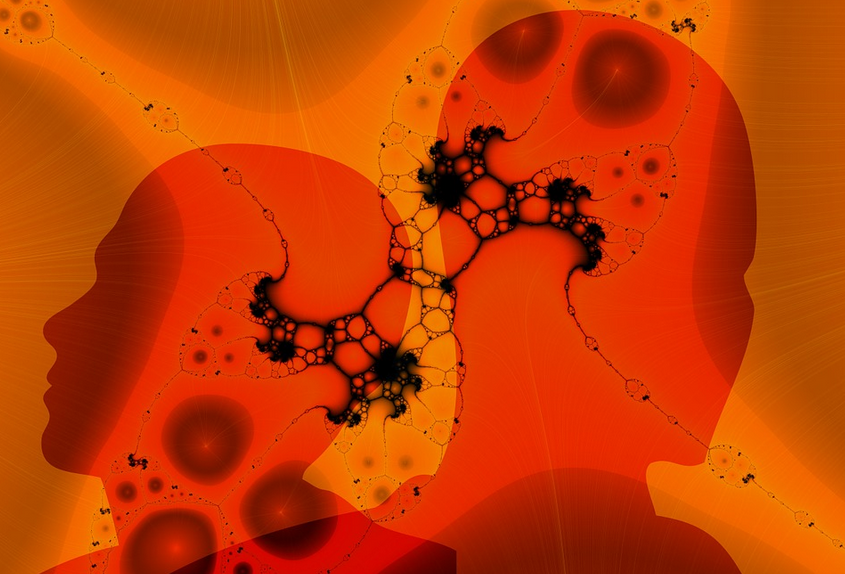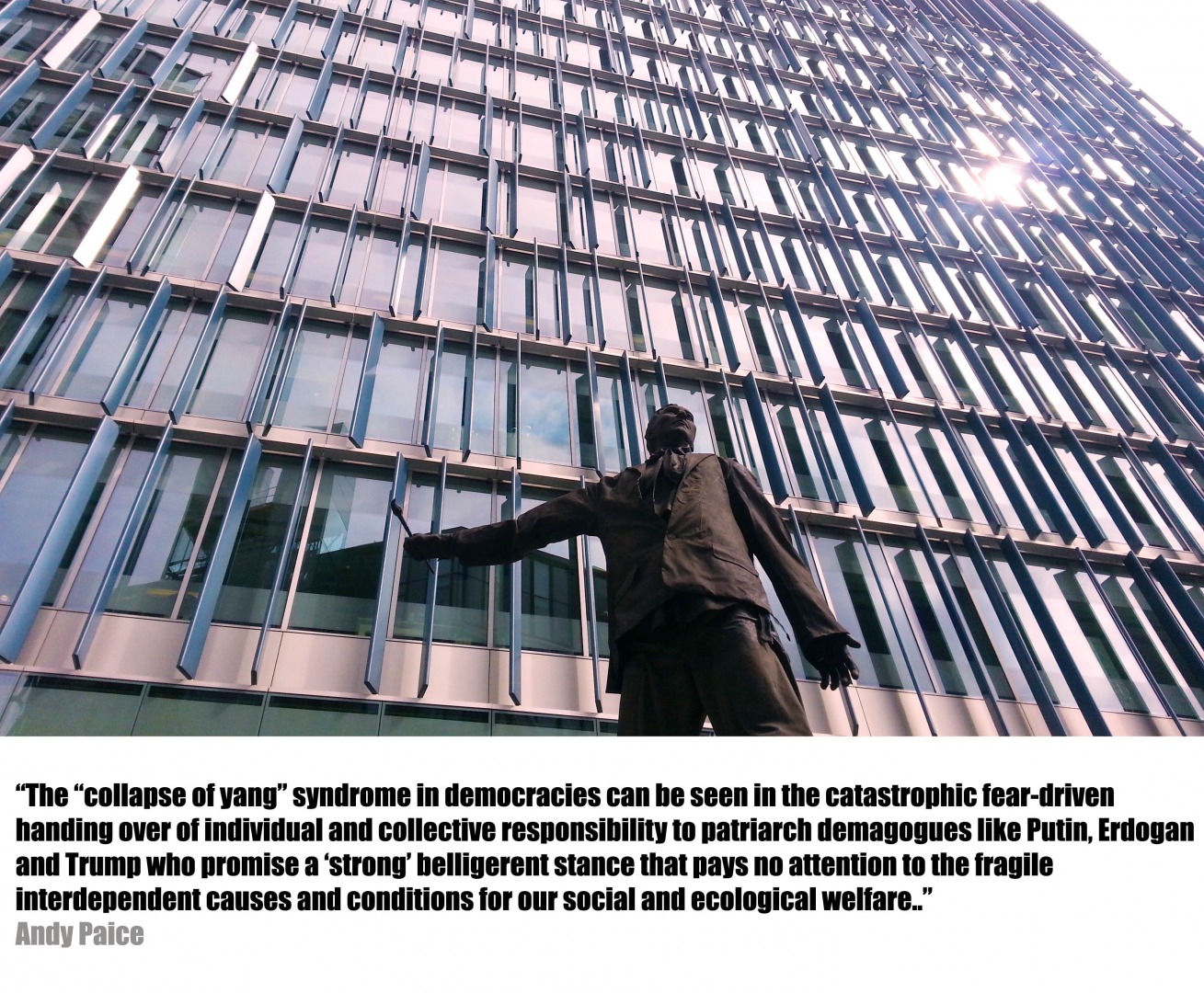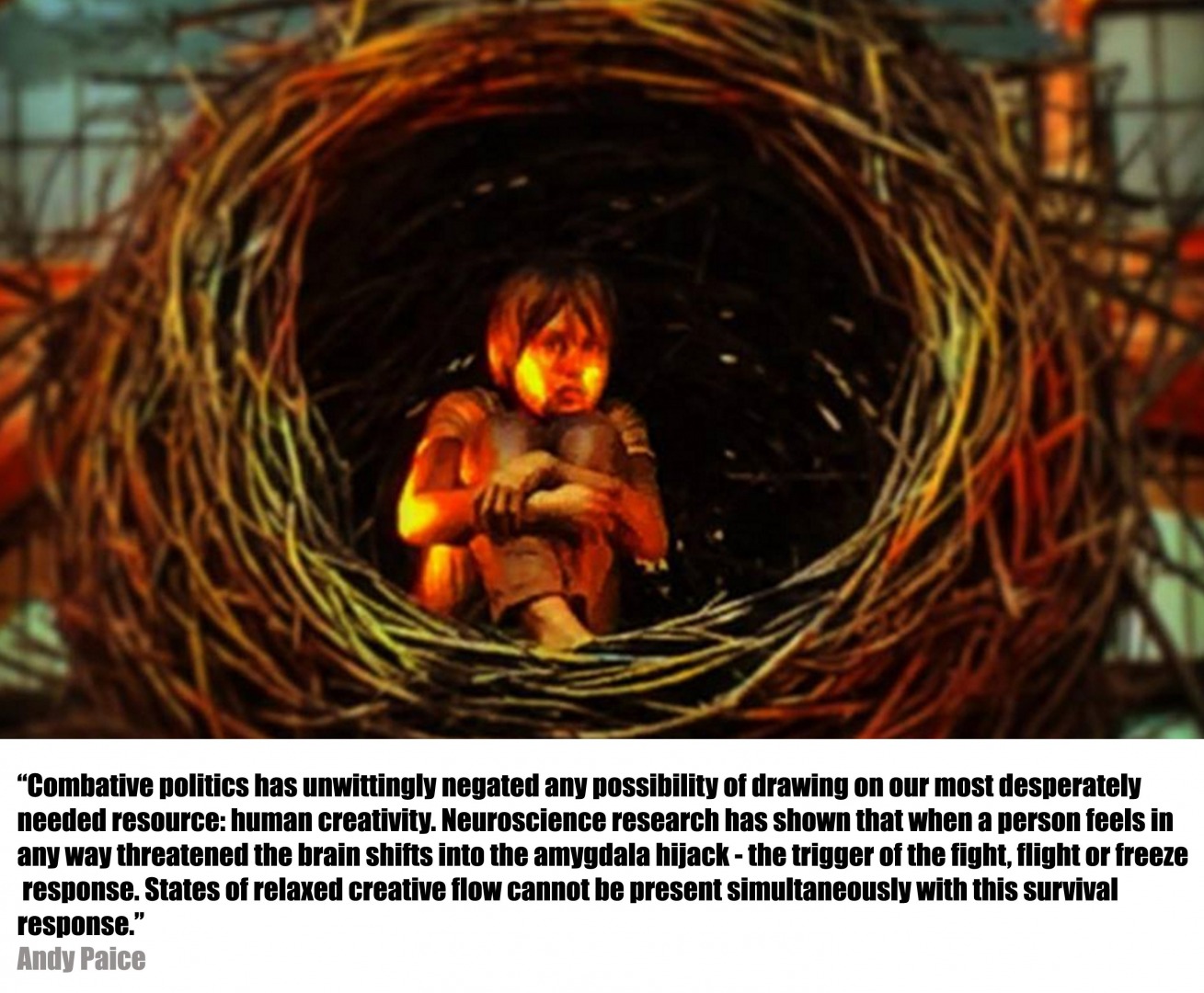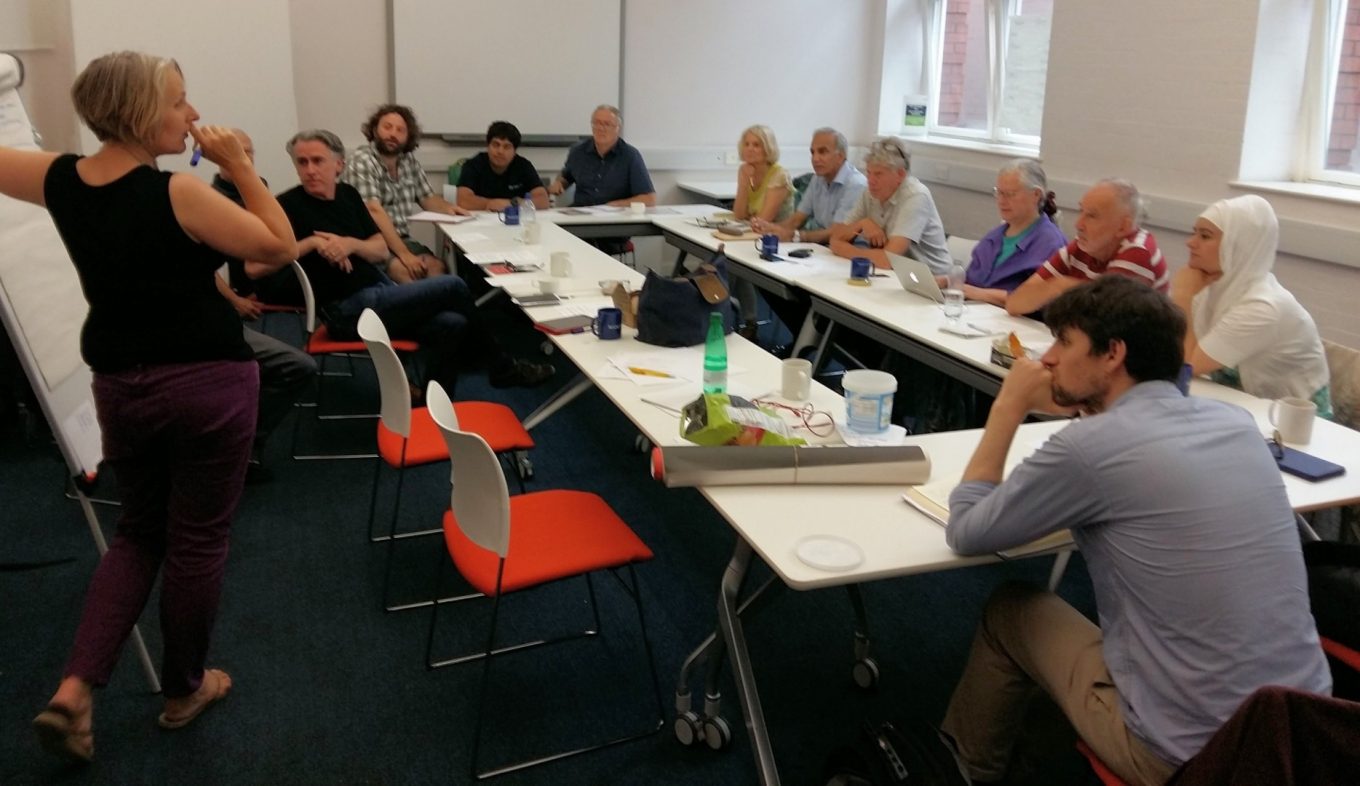
The Chinese philosophy of Taoism expounds the complementary principles of yin and yang, where yang is the active, driving, masculine principle and yin is passive, receptive and feminine. It holds that the movement and balance of these two polarities is what creates harmony in nature and society. When these principles are out of balance the outcome is disruption and disintegration.
This is a useful lens through which we can examine the present state of democracy in the world. Looking through it what do we see? There’s a striking imbalance in our democratic systems, an excessive reliance on the ‘yang’ principle.
In its healthy form ‘yang’ politics is the visionary aspect that proposes ways forward for society, through the advocating of ideas and policies. However an over reliance on this has seen politics end up as a playground of (often binary) competing factions and positions. Our institutions are extremely patriarchal with politicians playing the role of the all powerful father figures, ‘the ones who know what to do.’ Whether our leaders are men or women there is a pressure to appear strong, aggressive, in charge.
As citizens, we tend to take on a passive role and transfer power to these leaders through voting systems to represent us and make informed decisions on our behalf. Indeed most people think of this top-down system of governance through elected representatives as being the only possible means by which democracy can be done. This model was indeed aligned with the structures of society in the 20th century, the era of Fordism, of mass production and mass consumption.
Yet now, as we progress into the 21st century, there are a plethora of indications that this particularly ‘yang’ style of democracy is failing. The representative system no longer truly represents the electorate, and no matter how people vote political decisions end up reflecting the interests of elites and globalised corporations. The internet is now empowering a Society 2.0 of active self-organisation through distributed networks. However, the distribution of political power remains very much enclosed at the top.
Further indications of democracy’s demise around the world are seen in our inability to tackle serious threats like climate change, ecological devastation, fundamentalist violence, mass migration and the staggeringly unequal distribution of wealth and resources. Trust in politicians, viewed as careerists, is at all time low and parliamentary politics is perceived as remote and inaccessible.
The present system of parties competing against each other for the support of generally passive and poorly informed populations locks humanity into repeating the same destructive results. In Chinese medicine there is a concept known as “the collapse of yang” which happens when maintaining a prolonged imbalance so depletes the body’s resources that nothing is left to sustain the process of rebalancing. The end result is a complete breakdown such as a fatal heart attack.
The “collapse of yang” syndrome in democracies can be seen in the catastrophic fear-driven handing over of individual and collective responsibility to patriarch demagogues like Putin, Erdogan and Trump who promise a ‘strong’ belligerent stance that pays no attention to the fragile interdependent causes and conditions for our social and ecological welfare.

The stakes are great. Our unreformed systems that may have provided stability in the past are now enabling the rise of leaders who risk provoking an intensification of social and economic upheaval, even warfare.
We urgently need a rebalancing of democracy. But what would that look like?
It requires an inversion of the current dominant logic. A shift needs to take place from top-down to bottom-up democratic systems. Rather than relying principally on voting to elect governments, people themselves must participate in governance. Inter-communicating networks of neighbourhoods, local and regional citizens’ councils and assemblies are needed that will formulate policies produced by inclusive deliberation rather than polarised debate.
In this case the role of politicians is inversed from being the ones who dictate to aligning with the more ‘yin’ principle of listening, acting transparently as true public servants and executing the will of citizens.
Whilst advocacy is a key feature of our current system the role of listening becomes paramount in reconnecting people with a say over their future. Recent referendums in Greece, Ireland and the UK have shown that there is increased public interest in politics when people have more of an input. So engagement in civic participation can be deepened even further by returning to Athenian forms of democracy such as randomly selected citizens assemblies that convene for a period of days to work on areas of public policy.
Combative politics has unwittingly negated any possibility of drawing on our most desperately needed resource: human creativity. Neuroscience research has shown that when a person feels in any way threatened the brain shifts into the amygdala hijack – the trigger of the fight, flight or freeze response. States of relaxed creative flow cannot be present simultaneously with this survival response.
We urgently need to work together to find creative new ways to solve society’s problems yet our established adversarial structures do not allow this. The party political system of tribal allegiances that verbally attack each other in the quest for power runs counter to the basic neurological nature of creativity. As does our entire Winner Takes All society rooted in scarcity thinking and the less evolved, survival oriented reptilian brain.

One way of remedying this imbalance is through the creation of participatory assemblies and councils that are designed and facilitated to function according to ‘unity in diversity’ principles. Conflictual tension can be transformed into creative collaboration in spaces mediated by trained facilitators where people feel safe to drop their defences and share their ideas and opinions.
Such assemblies would have multiple benefits. They would be forums in which people of diverse socioeconomic backgrounds, races, values and perspectives could come together and listen to each other and to a variety of experts. This in itself would foster an acceptance of difference and provide a civic education in the issues communities face. Greater unity and social cohesion arise as such forums help people to gradually move beyond fixed positions and prejudices.
Dull and uninspiring, overly intellectual, using exclusive, elitist forms of language: these are criticisms of our present day parliamentary manifestations of democracy. So on the opposite side of the spectrum, free from the burden of party posturing, citizens’ democratic conventions could be places for a playful yet serious reinvention of democracy and the celebration of human wholeness and diversity.
Rather than merely engaging in heady debate and deliberation, people who feel moved to paint, sing or dance or enact the issues of the day would find encouragement to express themselves in a variety of embodiments. Imagine leaders, citizens and stakeholders creating a collaborative piece of art to discover their shared humanity before engaging in dialogue!

Of course in a society where many are having to deal with socioeconomic pressures, making them time and/or money poor, new mechanisms will have to evolve to support these kinds of civic participation. Like jury service, people could be compensated for their participation or this is perhaps another example where the increasingly popular idea of a universal basic income would be essential.
Digital technologies are also another means of creating direct forms of democracy, bringing everyone into the conversations that feed into how we govern ourselves. For example citizens could vote or comment in real time on a variety of debates and proposed bills.
The emergence of a democracy that reconnects in this multiplicity of ways requires our existing political institutions to enter into more of the yin principle: receptivity and intimacy with the populace. It’s a transition that will not be easy. Paradoxically as citizens our task is to awaken from passivity and get democratically more ‘yang’! Self-organising a participatory movement is the way to reappropriate meaningful power.
A utopian dream? Well, 100 years ago votes for women were dismissed as an impossibility by many. The seeds of the future system can be planted now.
So in concrete terms how does this happen?
Of course the birthing of this more inclusive form of democracy will need grassroots organisation as well as support from the more progressive politicians in the mainstream of politics. It will require effort, courage and persistence in moving against the grain of the existing status quo (which is nevertheless looking increasingly unstable in the face the rise of anti-establishment politics and unexpected outcomes like Brexit.)
Various nations such as Canada, Iceland and Ireland are making promising steps towards Citizen created Constitutions. In the UK I myself am part of a group that is working to instigate a Constitutional Convention for a new Constitution.
Also in the UK following the Brexit referendum result calls for a Progressive Alliance where parties would work together in a politics of collaboration demonstrate this new way of thinking. The Scottish government has initiated a participatory approach with the online U.Lab course that invites citizens to co-create prototypes for the improvement of society.
These examples are literally the tip of the iceberg (you can find a whole catalogue of them at participedia.net.) The bottom-up movement is building globally.
Its success will require that collectively we learn greater awareness in the ‘yin’ principles of listening, collaboration and building networked assemblies and communities.
Are you ready to play your part?
Credits and Inspiration for this article
Mamading Ceesay – for editing assistance
Tom Atlee – Tao of Democracy: Using Co-Intelligence to Create a World That Works for All
Rosa Zubizarrata – From Conflict to Creative Collaboration: A User’s Guide to Dynamic Facilitation
Jim Rough – Society’s Breakthrough!: Releasing Essential Wisdom and Virtue in All the People
Charles Eisenstein – The Ascent of Humanity: Civilization and the Human Sense of Self
Otto Scharmer and The Presencing Institute – Theory U: Leading from the Future as It Emerges
Frederic Laloux – Reinventing Organizations: An Illustrated Invitation to Join the Conversation on Next-Stage Organizations
Joanna Macy -Coming Back to Life: The Updated Guide to the Work That Reconnects
Andy Paice is London based Coach, Facilitator and Mindfulness trainer. The focus of his work/play is facilitating and catalysing new ways of working and living that are fit for the realities of the 21st century. One of his major passions is the creation of participatory democracy initiatives and amplifying awareness of new politics through the
Reinventing Democracy YouTube channel . He teaches Mindfulness in community and corporate settings and facilitates community meetings. Andy is passionate about authentic human connection and the emerging collaborative commons paradigm. Prior to these activities he lived and practised as a monastic in the Tibetan Buddhist tradition in France from 1998-2007 where he accomplished a traditional three-year group meditation retreat. In his spare time he enjoys Contact Improvisation dancing, eating curry and running From Me to We a meetup group he created. You can check out his website www.andypaice.net and follow him on Twitter @andypaice











